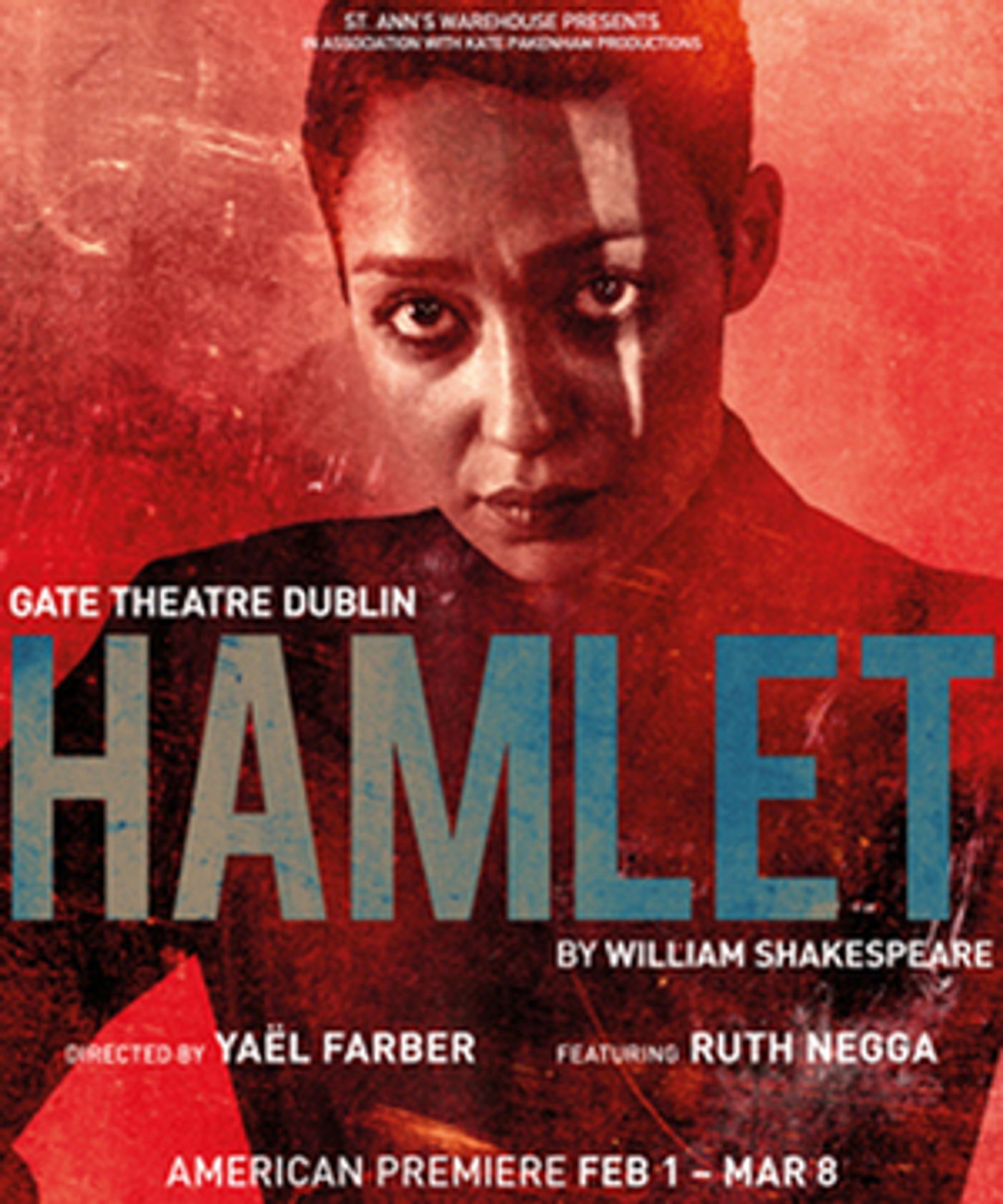St. Ann's Warehouse Extends HAMLET Starring Ruth Negga

St. Ann's Warehouse, responding to popular demand nearly two months before performances begin, has extended the celebrated Gate Theatre Dublin production of William Shakespeare's Hamlet, directed by Yaël Farber and featuring Academy Award nominee Ruth Negga (Loving, AMC's "Preacher"), in a "mesmerizing" (Irish Times) American stage debut, as the Dane. With Farber's direction and text edit, the focus shifts from Hamlet's anguish and identity to the force of resistance against the raw usurpation of power. The production, which begins February 1, 2020, will now play an additional week, through March 8, 2020.
In a four-star review of the production's premiere at the Gate, in the 2018 Dublin Theatre Festival, Michael Billington of The Guardian wrote, "Everything about this production feels freshly imagined." Max McGuinness, in a four-star review for The Financial Times, described Negga's portrayal of Hamlet as ranging "from boyish vulnerability to martial ferocity." Natasha Tripney, in The Stage, called Negga "an inspired choice as Hamlet-playful, vulnerable, resilient, radiant," while Katy Hayes, in the Irish Independent, praised the "fierce energy" of her performance and deemed it "one to cherish."
An ensemble of leading Irish actors joins Negga in the production, including Fiona Bell, Gavin Drea, Aoife Duffin, Nick Dunning, Peter Gaynor, Steve Hartland, Mark Huberman, Will Irvine, Gerard Kelly, Barry McKiernan, Shane O'Reilly, Owen Roe, and Gerard Walsh.
The creative team features Tony Award-winning set and costume designer Susan Hilferty, lighting designer John Torres, composer and sound designer Tom Lane, movement director Muirne Bloomer, voice director Andrea Ainsworth, and associate director Marc Atkinson Borrull.
Yaël Farber made her St. Ann's Warehouse debut in 2012 with Mies Julie, an intimate, heartbreaking adaptation of August Strindberg's play about a relationship envenomed by power, gender, and class dynamics, reset 18 years after South African apartheid ended. She applies to Hamlet her profound understanding of the emotional and social vitality and urgency in classic texts. Calling Shakespeare's iconic story of politics, vengeance, madness and murder one for our time, Farber explains that the play "makes vivid what it means to be living within a society that finds itself suddenly in the grip of a new leader, knowing that something is deeply rotten in the State." She says she hopes audiences experience "the extraordinary power of the play as must have been witnessed by Hamlet's very first audiences-who lived in highly volatile Elizabethan times, with no imminent heir to the throne-and how the play likewise articulates our own volatile, post-truth uncertainty." She says, "We are tribalizing at a level that, in the aftermath of the Second World War, we never thought we'd fall susceptible to again. The dark vein of our propensity to 'other' is emerging once again."
Far from the prince who cannot make up his mind, Farber understands Hamlet to be our surrogate-a figure who "powerfully articulates the process of grieving for what has been lost while navigating the sanity-challenging normalizing of what has been stolen." Farber engages what she calls "the core spiritual, political, and philosophical dilemma of the play: Each of us, like Hamlet, must reckon with how we must respond to such challenging times: Succumb to inaction and despair? Engage in denialism? Opportunism? Survivalism?" For Farber, "this 17th century text captures the gritty, painful journey of the individual up against an illegitimate power grab, who-at enormous personal cost-must walk the line from burdened despair to the imperative of resistance against a dark new order determined to hold onto power at all costs."
In an interview with Marie Claire, Negga argued for a nearly universal relevance of the play: "For a long time, Hamlet's characteristics have been monopolized by a certain type of person-these pale princes from the West. But what he goes through-his thoughts and feelings-they're all our things, aren't they?"
Hamlet is a highlight of the St. Ann's Warehouse 40th anniversary (2019-20) season, which kicked off with the American Premiere of Schaubühne Berlin's celebrated adaptation of Édouard Louis' History of Violence and continues with the American Premiere of Daniel Kitson's Keep, on now through December 19. Following Hamlet, due to unquenchable demand last season, The Jungle, a Good Chance Theatre co-production with London's National Theatre and The Young Vic, returns to St. Ann's Warehouse as the start of a tour to six U.S. cities. Having taken London, New York, and San Francisco by storm since it opened at the Young Vic in 2017, The Jungle "arrives with poignancy and power" (New York Times) to amplify our national conversation around immigration and the human rights of refugees to seek safety from harm and chaos.
Hamlet marks the first Gate Theatre Dublin production to tour internationally under the new leadership of Artistic Director Selina Cartmell. St. Ann's Warehouse presents the production in association with Kate Pakenham Productions. As the former Executive Producer of The Donmar Warehouse, Pakenham shares a long and close relationship with St. Ann's Warehouse, having produced Phyllida Lloyd's all-female Shakespeare Trilogy.
Performance Schedule, Tickets, and Other Information
St. Ann's Warehouse presents Hamlet February 1 - March 8, 2020. For a complete schedule of performances, please visit the Hamlet page on the St. Ann's Warehouse site.
Tickets start at $35 and can be purchased at www.stannswarehouse.org, 718.254.8779, or 866.811.4111.
Hamlet runs 3:15 including one intermission.
St. Ann's Warehouse is located at 45 Water Street in DUMBO, Brooklyn.
Powered by
|
Videos

